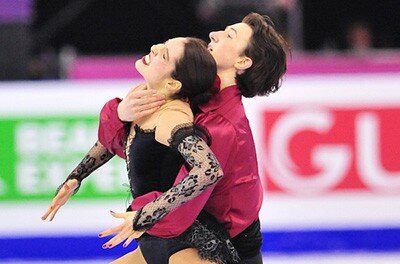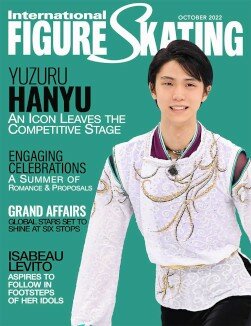

The top-ranked 24 skaters from the Junior Grand Prix Series hit the ice in Barcelona with high hopes and great expectations. Every season, the rising stars of the sport hit new heights and set higher standards, and this one was no different. Whereas doubles were once the norm at this level, the junior competitors are now executing quads and triples, and are attempting other difficult technical elements that put some of them on an equal footing with many of their senior counterparts.
The ladies event turned into a Russia-versus-Japan show-down, and, unlike the men, most of them remained on their feet, with just two falls in the long program. In her first season on the international circuit, Polina Tsurskaya continued the tradition of the Russian ladies’ dominance on the Junior Grand Prix stages.
The 14-year-old from Omsk mined gold in runaway victories at both her international assignments and headed into the Final on top of the leaderboard. Tsurskaya continued her winning trend in Barcelona, claiming the top spot in the short program with a new personal best score of 66.69 points. “I felt very confident in my performance, and it was the best of the season so far,”Tsurskaya said.
She stepped up the pace in the free, opening her program with a triple Lutz- triple toe-double toe combination, which earned 12.90 points. The score for this combination was higher than any awarded to any senior lady in either the short or long programs in Barcelona.With 195.28 points, Tsurskaya claimed her first Junior Grand Prix Final title. She now holds the records for the highest scoring free program and the highest combined score in the junior ranks.
“Obviously, I am very happy. I was a little nervous before the free skate because I was in first place after the short program and I needed to skate clean,” she said. “There are always some nerves, but I tried to be the strongest, to be on top and to win.”
Her victory marked the sixth consecutive time a Russian lady had claimed the Junior Grand Prix Final title.
Maria Sotskova, the 2013 Junior Grand Prix Final champion, ranked fourth in the short program with 62.64 points. “My elements were not as good as they have been, but I showed better emotions,” she said. She came back with a solid free skate, executing seven clean triple jumping passes, two of which were in combination.
The 15-year-old earned 184.01 points overall and claimed the silver medal. “I’m very happy to be in second place because after the short I was fourth, and that’s not a great place to be,” she said. “I watched the senior men and was very inspired by their skating. I was simply in awe and tried to skate like them.”
Japan’s Marin Honda, 14, landed in third in the short program with 63.69, a new personal best. She admitted to being a little nervous but calmed down after the warm-up. “The atmosphere at the Grand Prix Final is a little bit different from normal competitions. It feels a bit like pro wrestling when the announcers call your name, and the atmosphere of the supporters is a little bit different, but that gave me energy,” the Kyoto native said.
Honda landed five triple jumps in her free program, falling on the triple flip. She scored 178.64 points to capture the bronze in her debut at the Final. “I made mistakes, which were regrettable, but my goal was to win a medal, so I am happy that I got one,” she said. “Next year, I would like to come back to this stage and win first place.”
Russia’s Alisa Fedichkina, second after the short, fell to fourth with 178.11 points. Yuna Shiraiwa from Japan scored 173.82 points and wound up in fifth, and her teammate, Mai Mihara, finished sixth with 166.25 points.
FALLING STARS
The men’s event did not live up to the pre-event hype. Though all six remained on their feet in the short program, the free was a different matter. In total, there were 10 falls by five men, including two by the winner. Only three of the five men who attempted triple Axels executed clean landings.
Expectations were high for America’s Nathan Chen following a third place finish at the Final in 2013. Hampered by injury last season, Chen claimed silver at the one event he contested. This year, he headed into Barcelona as the man to beat. Skating last in the short, Chen’s short program to a Michael Jackson medley had the audience clapping to the music.
The 16-year-old California native reeled off a clean triple Axel, a triple Lutz-triple toe combination and a triple flip on his way to winning the segment with a personal best score of 78.59. “I love Michael Jackson. As kids, we used to moonwalk across the floor. My choreographers chose it for me because they wanted me to do something out of my comfort zone,” Chen explained.
He attempted three quads in his long program, stumbling out of the first and falling on the second, but he cleanly executed the third in combination with a double toe. Chen also took a tumble on the triple Axel attempt. He earned 225.04 points in total and skated off with the gold medal. It had been four years since an American man had claimed the title. “I’m very excited that I was able to become the Junior Grand Prix Final champion. It’s a big accomplishment for me,” Chen said.
In his second season on Junior Grand Prix circuit, Russia’s Dmitri Aliev landed in second in the short with a personal best score of 76.78, less than two points behind Chen. “I’m crazily happy, so pleased to get all the elements I wanted and achieve everything I could,” the 16-year-old said.
Aliev, the only man not to take a tumble in the free, opened his program with back-to-back quads, one in combination, a triple Axel-single loop-double Salchow combination, and a triple Lutz-triple toe. In the second half of the program, he singled three jumps, but his combined score of 211.22 points was enough to keep him in second. “I’m super excited to have won a medal here, even with this kind of performance,” he said. “It was the biggest competition I’ve ever been to and the first time I skated in front of such a big audience.”
Japan’s Sota Yamamoto, the runner-up last year, earned 72.85 points in the short after stepping out of the triple Axel and earning no points for his change camel spin. He ranked third in the segment. In the free skate, Yamamoto fell on his opening triple Axel and later in the program under-rotated the quad toe. He landed six clean triples and held onto third place with 205.31 points.
“As I was second last year, I was aiming for a better result this year. I’m disappointed not to have accomplished that. I was determined not to screw up the other triple jumps, and I achieved that, the 16-year-old said.
America’s Vincent Zhou, third in the free, placed fourth overall with 204.56 points. Daniel Samohin from Israel, who fell five times in his free program, was fifth with 184.68 points, and Canada’s Roman Sadovsky landed in sixth with 168.40 points.
DANCING UP A STORM
The last time an American ice dance team mined gold at a Junior Final was in 2008 in Goyang, Korea. Lorraine McNamara, 16, and Quinn Carpenter, 19 headed to Barcelona on a high, having won all four events they contested this season and were in the hunt for gold in Spain.
The duo captured the top spot in the short dance, set to the music from the “Peer Gynt Suite,” by less than a point. They earned Level 4s for the twizzles, the rotational lift and the second “Starlight Waltz” pattern and earned 65.90 points. “We wanted something that really stood out among the other marches and waltzes, and this music really gives us energy,” McNamara said.
Maintaining the momentum in the free, McNamara and Carpenter earned Level 4s for their two lifts, the twizzles and the spin and racked up a combined score of 158.26 to claim their first Grand Prix Final title by a margin of 7.40 points. “We had a great time in Barcelona and are happy with how we did. After last season, we learned to focus on the present, not the future,” Carpenter said in reference to not making the Final in 2014.
McNamara and Carpenter said that they were not thinking about competing in Barcelona when they chose “Carmen” for the free dance, McNamara said.“That had nothing to do with it.We knew it was powerful and had a strong character, and it was important for us to express that.”
Russia’s Alla Loboda turned 17 the day of the short. She and her partner, Pavel Drozd, danced into third with a personal best score of 64.01. “It was a celebratory performance for us,” he said. Skating to “Lo Ti Penso Amore” and “Paganini 5,” the defending Junior Grand Prix Final silver medalists scored 86.85 points for their free dance and moved up to second with 150.86 points. “We had some little mistakes, but the most important thing was we got pleasure from skating, and we are very happy,” Drozd said. It was the second consecutive Junior Grand Prix Final silver medal for this team.
America’s Rachel Parsons and Michael Parsons sat in second after the short dance but ranked fifth in the free and slipped to third overall. The brother-and-sister team collected 144.41 points to claim their first medal at a Final. “We didn’t really put out the free dance we wanted to,”Rachel Parsons said.“We’re both frustrated that we didn’t get to showcase our program.”
Russia’s Betina Popova and Yuri Vlasenko were fourth with 143.96 points. Marie-Jade Lauriault and Romain Le Gac from France placed fifth with 141.44 points, and Anastasia Skotpcova and Kirill Aleshin twizzled into sixth with 134.61 points.
FLYING START
In their first season on the Junior Grand Prix circuit and less than 18 months after joining forces, Russia’s Ekaterina Borisova, 16, and Dmitry Sopot, 17, claimed the junior pairs crown. Winning the short program with a personal best score of 60.29 was not what the Perm-based duo had expected. “This was the best skate we have ever had,” Sopot said.
The duo received two technical deductions in their “Lawrence of Arabia” free program but still earned a new personal best score and, with 171.86 points in total, claimed the top podium spot. “We’re thrilled. I have no words,” Borisova said.“We did not expect so much from our first international season. In fact, we did not know what to expect. We felt responsibility and wanted to represent our country well.”
Anna Dušková and Martin Bidař from the Czech Republic, who were third after the short with 55.78 points, skated into second place overall, becoming the first Czech pairs team to ever medal at a Junior Grand Prix Final. Dušková and Bidař, who also compete internationally in singles, had two minor technical errors in their free program to “La Leyenda del Beso”but moved up with 162.33 points in total. “We are so happy because we have never reached as high as we have now. I can’t explain how happy I am,” Dušková said.
Russia’s Amina Atakhanova and Ilia Spiridonov ranked second after the short with 58.58 points.“We’re not so satisfied,” Atakhanova said. “In competition, things don’t always work out as planned, but this is just the beginning for us.”
Atakhanova and Spiridonov received deductions for a lift and an under-rotation of the side-by-side triple jumps, and a downgrade for the Salchow in their long program set to music from “Funny Girl” and “Gigi.” Their overall score of 162.00 dropped them to third. “We feel more disappointment with the skate than happiness with the placement,” Atakhanova explained.
Their teammates Anastasia Gubanova and Alexei Sintsov landed in fourth with 157.09 points. Ukraine’s Renata Oganesian and Mark Bardei placed fifth with 149.87 points, and the fourth Russian team of Anastasia Poluianova and Stepan Korotkov were sixth with 145.27 points.
RELATED CONTENT: 2015 GRAND PRIX FINAL
NEXT EVENT: 2015 JAPANESE NATIONALS




